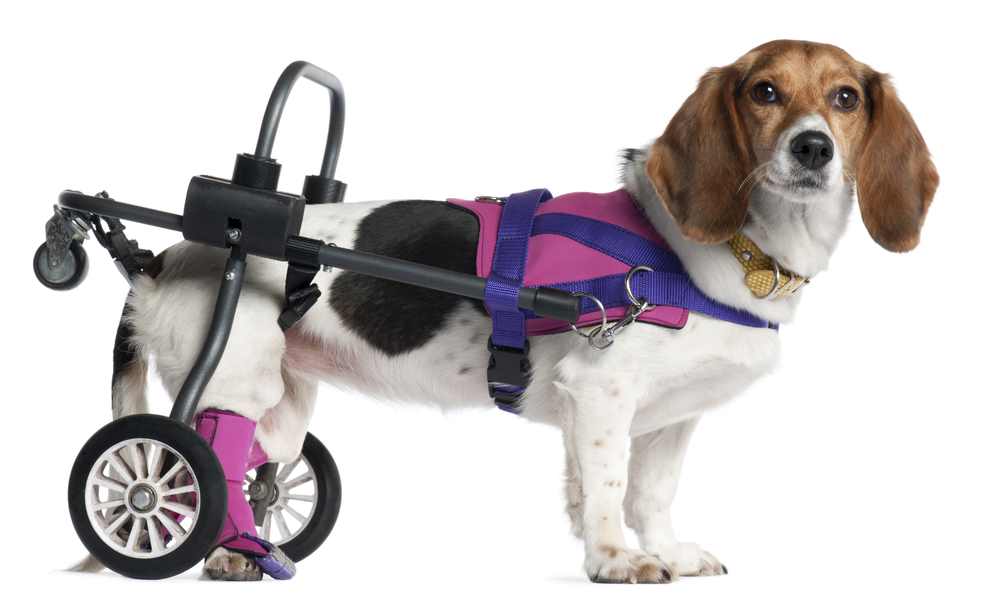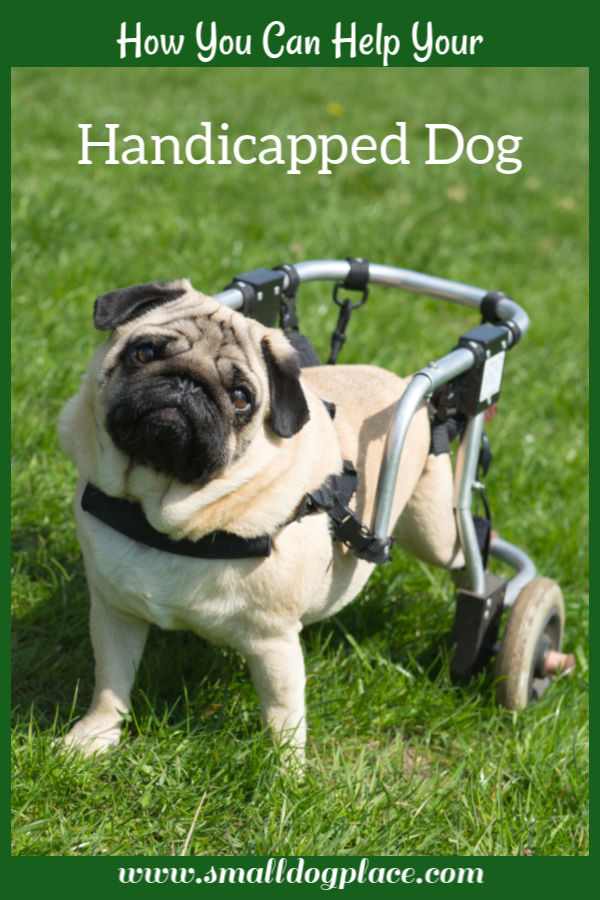- Small Dog Place Home
- Health
- Handicapped Dog
Your Small Handicapped Dog: 5 Ways You Can Help
Your Small Handicapped Dog Updated 04-09-2024
Our small and toy breed dogs bring a tremendous amount of joy into our lives. Thanks to their longer average lifespans, we get to enjoy their company, loyalty, and unconditional love for extra years.
However, with more time spent in their golden years, small dogs often face handicaps that come with age such as mobility issues from arthritis and other degenerative conditions.
 A small handicapped dog being helped with the use of a wheelchair.
A small handicapped dog being helped with the use of a wheelchair.This article will explore some of the hardships that our handicapped small dogs face and some products, gear, and services that can help them enjoy the exceptional quality of life they deserve.
Mobility Assistance for Your Handicapped Dog
Some toy breeds have special risk for certain kinds of conditions that can affect mobility. For example, Dachshunds are at risk for IVDD, a degenerative spinal disease. Welsh Corgis are prone to Degenerative Myelopathy, a condition that can cause paralysis of the hindquarters.
Other conditions that can affect just about any breed of dog include arthritis, injuries, and plain old senioritis.
To help our little furry friends, it is essential to take note if their mobility is starting to decline. Looking into products that can help avoid further injury as well as strain on the joints and back can go a long way towards helping your pooch hang on to good health.
Here are a few products to consider to help your dog with declining mobility:
Check the Stairs
Going up and down stairs can be hazardous, particularly for small dogs that have joint, hip, or back problems. Providing carpeting or non-slip pads on slippery stairs such as hardwood or laminate can help.
In addition, sometimes a ramp can make a regular route safer for dogs. Additionally, if your small dog enjoyed climbing up on the sofa to reach your lap, dog stairs may help.
Lifting Harness
Specially designed lifting harnesses can help get your dog up and down stairs or other obstacles without also straining your own back.
In fact, there are now options to help handicapped pets get in and out of the car with the use of special ramps that fit in your vehicle.
Doggy Wheelchairs
There are now several trusted manufacturers that offer specially designed doggy wheelchairs that allow dogs with severe mobility issues to get around the house and enjoy the outdoors.
Braces and Splints
If your dog has a bad back or an injury in the leg, it is now relatively affordable to find a custom brace or splint to help make sure the injury does not get worse with everyday movement.
Natural Supplements for Your Handicapped Dog
It turns out that there are a variety of natural supplements that can help our disabled small pets. In some cases, going with an effective natural alternative can prevent your dog from experiencing the harmful side effects of some prescription medications.
As always, it is important to discuss using supplements with your vet as they can sometimes interfere with other medications. Here are a few good options to consider:
CBD Oil for Your Handicapped Dog
CBD Oil: This natural plant extract made from the hemp plant has been shown to reduce inflammation and pain, help with skin and digestion health, as well as improve mobility in dogs with arthritis.
Glucosamine Chondroitin
Glucosamine Chondroitin: This supplement has long been recommended by vets to help improve joint health and slow the progression of degeneration from arthritis.
Lavender Oil
Lavender Oil: This essential oil has long been believed to help calm anxiety. One study showed it reduces heart rates in dogs, and another showed it reduced stressful behaviors in dogs in a shelter.
Fish Oil
Fish Oil: Rich in omega 3 fatty acids and also anti-inflammatory, many vets recommend this supplement to help our aging pets maintain a glossy coat and healthy skin.
Physical Therapy and Movement for Your Handicapped Dog
When disability strikes our pets, it can be easy to give in too quickly and reducing the overall amount of exercise to help our furry friend more comfortable.
After all, they may not be as interested in games and long walks now that pain or discomfort comes with the activities they used to enjoy. However, it is critical to help our disabled pets continue to get exercise and movement to maintain overall muscle tone and flexibility.
There are several options that you may find in your area for therapies designed with our disabled dogs in mind:
Canine Physical Therapy
Canine Physical Therapy: When people are dealing with disabling injuries or mobility issues caused by stroke or degenerative arthritis, they often see a trained physical therapist as part of their wellness program. In fact, there are specially trained veterinarians that can also provide such services for our dogs.
Acupuncture for Dogs
Acupuncture for Dogs: Acupuncture for dogs is based on traditional Chinese medicine and is a technique that some specially trained holistic veterinarians practice. It may be particularly helpful to reduce pain and inflammation from arthritis, injury, and other illnesses in our small dogs.
Doggy Massage
Doggy Massage: Although there are specialists for canine massage, you can also learn some of these techniques at home. Helpful for stimulating blood flow and massaging muscles that may be sore and achy, massage is another option to consider for your handicapped pocket pet.
Low Impact Exercise for Your Handicapped Dog
Low Impact Exercise: If your dog is starting to slow down, achy joints may be part of the problem.
It might be time to change up your exercise routine to include low impact exercise options such as swimming or walking on softer terrain such as grass rather than concrete.
Incontinence Products & Modification Assistance for Your Handicapped Dog
Many conditions such as IVDD, spinal injuries, urinary tract infections, hormonal imbalances, and others can cause urinary incontinence in our small dogs. Also, certain medications can cause incontinence.
If you notice that your dog is suddenly having some trouble making it outside for their potty break, then it is a good idea to schedule a check-up with your vet.
It could be a sign of a serious medical condition that requires treatment. However, once other underlying causes have been ruled out, you may still be faced with the challenge of a small breed dog unable to uphold his end of the house training bargain you made when he was a pup.
Luckily, there are several things you can do to make this situation less acute while minimizing damage to your home:
More Frequent Potty Breaks
Sometimes, the most natural solution is right in front of our noses. As our dogs age, needing to urinate more often comes with the territory. So, changing up the routine a bit to get them out more often is often the first line of defense.
Pee Pads
Most dogs learn to use these scented and absorbent pads if they are not able to hold it long enough to get outside. With a waterproof bottom, they will prevent your carpet and/or hardwood floors from getting damaged. Pee Pads are available in disposable as well as reusable forms.
Doggy Diapers
Made for either male or female dogs, these disposable diapers are a great choice if your dog has wholly lost bladder or bowel control. You can also find cute little covers for them to make them a bit more attractive.
Male Dog Diapers
For male dogs, we recommend male wraps or belly bands. These can purchased as reusable or disposable. This product is an example of a reusable male diaper. This is a great choice for incontinence boys that can be used and then disposed.Girl Dog Diapers
This is the washable version of diapers for girls. If you prefer disposable girl dog diapers, this is a good choice.Medications
In some cases, your vet may recommend incontinence medications that may solve the problem or make it less severe. For example, the drug phenylpropanolamine can help some dogs improve their bladder control by strengthening the urethral sphincter. Talk to your vet to see if this medication would be right for your dog.
Healthy Diet Resources for Your Handicapped Dog
A healthy and well-balanced diet is of course recommended for all dogs, regardless of size, age, or health. However, for dogs that have health issues, a great diet can make a big difference.
For example, some persistent skin and ear problems can actually be caused by an allergy or intolerance to specific ingredients in your dog’s diet.
And, one recent trend in dog food is to incorporate small additions of home-cooked nutritious foods to regular meals. Of course, many foods that are safe for people are actually highly toxic to dogs, so this is certainly a practice that requires research and care. Here's a list on those foods dogs shouldn't eat.
Holistic Veterinarians that Can Help Your Handicapped Dog
Discussing your dog’s situation with a holistic veterinarian may offer you some natural ways to help your dog deal with poor digestion, a picky appetite, chronic inflammation, poor sleep, and many other common problems our small and toy breeds face as they age.
Also, since holistic vets have all of the same training of regular vets plus additional training in alternative healing practices, they are an excellent resource to learn more about some of the services mentioned in this article. If they are not trained in acupuncture, for example, the odds are good that they know a vet in your area who is.
If you can't find one in your area, the American Holistic Veterinary Medical Association may be able to help.
 Help Your Handicapped Dog
Help Your Handicapped DogAbout Janice (author and voice behind this site)
Having lived with dogs and cats most of her life, Janice served as a veterinary technician for ten years in Maryland and twelve years as a Shih Tzu dog breeder in Ohio.
Her education includes undergraduate degrees in Psychology with a minor in biology, Early Childhood Education, and Nursing, and a master's in Mental Health Counseling.
She is a lifelong learner, a dog lover, and passionate about the welfare of animals. Her favorite breed for over 50 years has been the Shih Tzu, but she has also lived with Poodles, Maltese, Yorkshire Terriers, Beagles, English Bulldogs, Carin Terriers, and a Cocker Spaniel.
When not writing, reading, and researching dog-related topics, she likes to spend time with her eight Shih Tzu dogs, husband, and family, as well as knitting and crocheting. She is also the voice behind Miracle Shih Tzu and Smart-Knit-Crocheting
Does This Article Deserve Your Thumbs Up?
We always appreciate your support and encouragement. Your thumbs up means so much to us. Please like this article.
If you find this page or any page on Small Dog Place Helpful, or useful in anyway, I'd love it if you would click the small heart found on the bottom right of each page.
You can also share or bookmark this page -- just click on the:

Free Monthly Newsletter
Sign Up for Our Free Newsletter and get our Free Gift to You.
my E-book, The Top 10 Mistakes People Make When Choosing a Dog (and how to avoid them)






